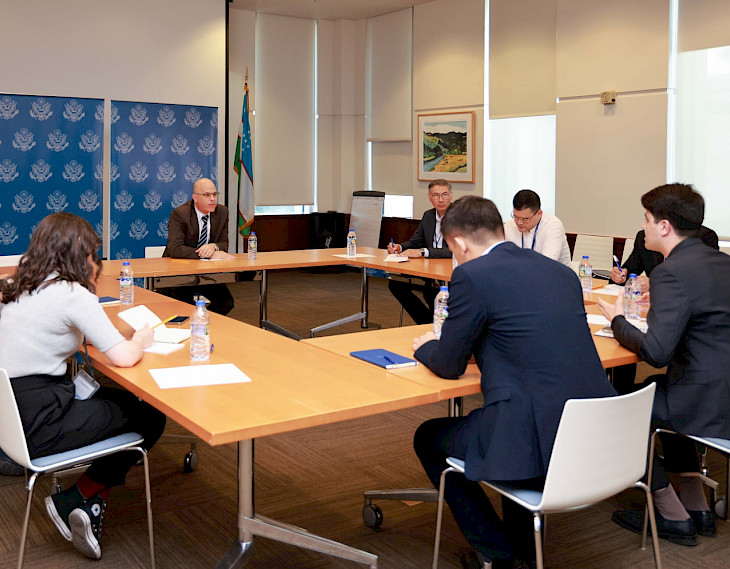The U.S. Ambassador to Uzbekistan, Jonathan Henick, held a meeting with media representatives. He spoke about the current state of relations between Washington and Tashkent, emphasizing that these relations are now closer than ever. Henick noted that in recent years, citizens of Uzbekistan have submitted a record number of applications for U.S. visas, and the U.S. consulate has issued a record number of visas, reports Kun.uz.
According to him, dialogue with the Donald Trump administration continues at a good level, especially regarding cooperation on migrant deportation, which Washington is very pleased with.
More than 30 years have passed since the Central Asian republics gained independence, yet no U.S. president has visited the region during this time. There were rumors that Joe Biden might visit Kazakhstan or Uzbekistan at the end of his term, but this did not happen. Now, the Uzbek delegation has sent an official invitation to Donald Trump through Saidov and Kamilov.
"Both Foreign Minister Saidov and Special Presidential Representative Kamilov, during their visit to Washington, invited President Trump to visit Uzbekistan, possibly within the framework of the 'C5+1' summit. The White House is very pleased with the invitation and is seriously considering it. Given that it has been more than 30 years since independence, I believe that now is the right time for a U.S. presidential visit to the region," noted Jonathan Henick.
"We Encourage Uzbekistan to Maintain Relations with the EU" – Ambassador Comments on Lavrov’s Remarks
Regarding the strategic partnership agreement signed in Samarkand between Central Asia and the European Union, Henick stated that the U.S. understands and supports this step. Responding to a question about Sergey Lavrov's statement that the EU seeks dominance in the region, the ambassador emphasized that Uzbekistan deserves full-fledged partnerships with everyone.
"Uzbekistan maintains good relations with both its neighbors and with the U.S. and the EU. The U.S. properly understands and fully supports the strategic partnership. We encourage Uzbekistan to continue such good and friendly relations, as it contributes to strengthening ties between the U.S. and Uzbekistan," said Henick.
"It Will No Longer Be Possible to Seek Asylum for Illegal Work"
In his conversation with journalists, Jonathan Henick also touched upon the migration policy of the new U.S. administration. According to him, the country's doors are no longer open to all migrants. The U.S. welcomes legal tourists, workers, students, and business representatives, but is tightening border controls.
"Now, opportunities to obtain asylum for illegal work are seriously restricted. There are many legal ways to enter the U.S. We are glad that last year over a thousand Uzbek citizens studied in the U.S. We expect this number to grow. Uzbek students should also work at the UN. However, for those crossing the border illegally, the opportunities to work in the U.S. have been significantly reduced," Henick emphasized.
Uzbek Delegation Did Not Discuss Trade Tariffs in Washington
In early April, Donald Trump announced the introduction of new trade tariffs for all countries, including Uzbekistan — at a rate of 10%. Experts believe this will not cause a strong direct blow to Uzbekistan’s economy, but its trading partners may suffer.
According to the ambassador, the issue of lifting tariffs was not discussed during the Uzbek delegation’s visit to Washington.
"Tariffs on Uzbek goods are among the lowest in the world. This issue was not raised in the meetings I participated in. However, I know the delegation visited Washington and met with representatives of the IMF and the World Bank. Perhaps the issue of trade tariffs will be discussed in the future," Henick noted.
"Democracy and Human Rights Policy Will Hardly Change"
Following Donald Trump's re-election as U.S. President, concerns are growing about a drift toward authoritarianism, especially amid rumors that he might seek to amend the Constitution for a third term. This raises worries about the future of liberal values and human rights globally.
However, according to Henick, human rights support will remain an important part of U.S. foreign policy.
"I have worked as a diplomat at the U.S. State Department for over 30 years under both Republican and Democratic administrations. During that time, the protection of human rights, freedom of speech, and freedom of the press has always remained one of our main priorities. It is not just policy — it reflects our national identity. I believe support for human rights will continue, perhaps in a different format. Under the Trump administration, these issues will be more closely integrated with national security matters," said the ambassador.
The U.S. Does Not Plan to Recognize the Taliban Government
Afghanistan, Uzbekistan’s neighbor, remains a crucial factor for regional stability. Since the Taliban came to power in August 2021, no country has officially recognized their government. Donald Trump, in case of returning to power, has promised to retrieve American military equipment left in Afghanistan. He has not yet answered media questions about recognizing the Taliban.
According to Jonathan Henick, Washington still does not plan to recognize the Taliban.
CentralasianLIGHT.org
April 28, 2025

